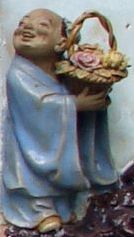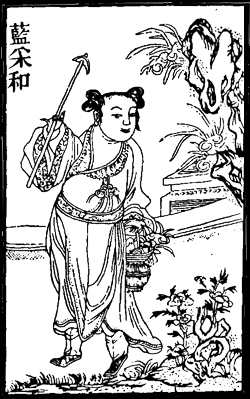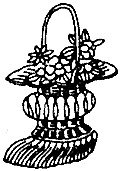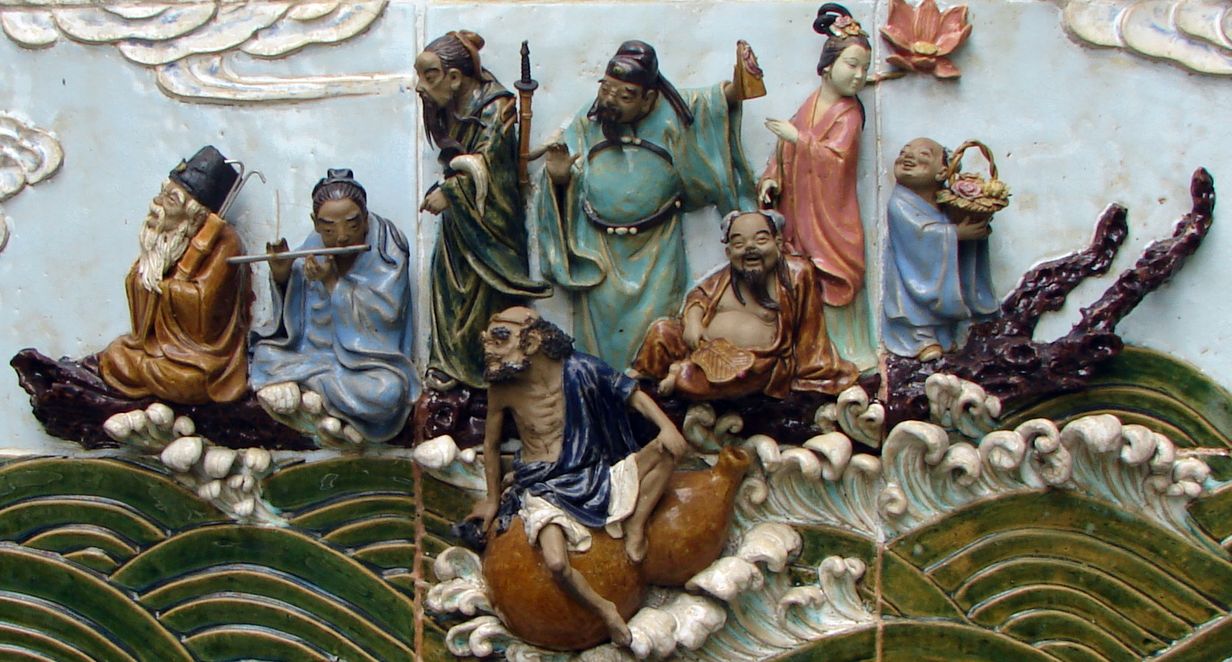
Content created: 2010-12-30
File last modified:
Go to previous or next story.

LÁN Cǎihé 蓝菜和 = an aimless teenager, fond of singing, possibly mad
Madame HÚ 湖 = his evil stepmother
HÚ Qiān 湖千 = her evil brother
LǏ of the Iron Crutch (LǏ Tiěguǎi 李铁拐) = a Daoist immortal (story 2)
HÉ Xiāngū 何仙姑 = another Daoist immortal (story 6)
Various puzzled citizens, most of them disapproving

Nobody knows very much about the immortal Lán Cǎihé 蓝菜和. Some say that he (or possibly she) was a Táng 唐 dynasty poet named Chén Táo 陈陶 or that he went by the pseudonym of Yǎngsù 养素 (“Cultivate Simplicity”).
One tradition holds that he was born in Jiāngnán 江南 in Húnán 湖南 province and that his mother was pregnant with him for 18 months. The night before he was finally born, his mother dreamt that the immortal Lǐ of the Iron Crutch (Lǐ Tiěguǎi 李铁拐), whom we met in story 2, came and told her that her son was going to be very special. In view of her long pregnancy, this was not much of a surprise —she was feeling pretty special herself just then— but Lǐ added that the lad was destined to do great things, which was encouraging.
In fact, the kid seemed disappointingly ordinary, perhaps even a bit dim, although he sometimes said things that were side-splittingly funny. When he turned ten, his father at last hired a well recommended teacher to try to awaken the promised specialness, and in particular to focus little Cǎihé on passing examinations so he could become a rich official, although the chances did not seem good.
Unfortunately, the teacher turned out to have dangerously Daoist leanings, and Cǎihé became more and more interested in the life of the Way instead of the life of a rich official. (Even today, practical parents worry about teachers who tempt students to study what is interesting instead of what will make them rich.)
The training did not progress very far because a few months later Cǎihé’s mother died, and his father’s concubine, Lady HÚ 胡, replaced her as chief wife. His father took sick not long afterward, and Lady Hú decided to speed things along with a draft of poison for the old man. His father’s death was destined to leave Cǎihé in charge of the family’s money, if not immediately, then eventually, so Lady Hú and her younger brother HÚ Qiān 湖千 decided to eliminate him as well, preferably by slitting him from one end to the other.
Fortunately, a family servant overheard their plan and advised Cǎihé to run away. He ran until he reached a river, with Hú Qiān in hot pursuit. Having no way of escape, Cǎihé jumped to his death in the raging waters. (He had not been taught to swim any more than he had been taught much of anything else. Besides, swimming was a dangerous activity and one unrelated to becoming a rich official, and parents discouraged it, just as they do today.)
Imagine Hú Qiān’s surprise when a ray of bright light suddenly shot up from the river, and on it a huge lotus, and standing on the lotus Lán Cǎihé with the two immortals Lǐ of the Iron Crutch, whom we met in story 2, and Hé Xiāngū 何仙姑, whom we shall meet in story 6. Perhaps this was the specialness that Lán Cǎihé’s mother had dreamt about, but Hú Qiān was not eager to find out. As he turned to run away he was struck by lightning and burnt to a crisp.
Lán Cǎihé was transported to a wooded slope on Wángwū Mountain 王屋山 in Hénán 河南 province, where he was cold and hungry and miserable. He was also very frightened, for he could hear the sounds of hungry animals in the woods all around him. Suddenly a huge snake attacked him. In the ensuing struggle, Lán Cǎihé ended up astride the neck of the snake, holding on so well that the snake could neither shake him off nor get its fangs into him. It was very brave of him. In fact, it was the first brave thing he had ever done. Eventually the snake turned into Lǐ of the Iron Crutch, who told him that he had passed his test, and took him back to his cave to study the Way.
Nothing is known of Lán Cǎihé’s training in the mountains, but soon he began to wander among the many villages of the plains. Tradition tells us that he wore the same garments both in summer and in winter, inattentive, like many teenagers, to both heat and cold.
He did no work, but simply walked about, sometimes panhandling a little money, which he spent on wine or hung as a necklace about his neck or gave to the poor. Sometimes he simply dropped it along the road, which made him popular with beggars and children.
When in his cups, he sang songs that reasonable people thought were nonsensical and gullible people thought must surely conceal great wisdom, although they couldn’t decide what it was. As he sang, he kept time with a three-foot-long staff. Tradition tells us that he was very good at telling jokes and at wisecracks and witty comebacks. It is even said that he could make people fall on the ground laughing.
Nearly everybody agreed that he was mad, but a few people said that, like most teenagers, he simply needed a good beating.
Everybody also agreed that he never aged. The oldest people in a village would tell the youngest people that he was unchanged from their childhood. And when time passed and the youngest people became themselves the oldest, they told their children the very same thing. And so from generation to generation it was said that Lán Cǎihé was an eternal teenager. And some grumbled that this was confirmed because he was also eternally irresponsible.

Some explained his odd behavior by saying that he was Chìjiǎo Dà Xiān 赤脚大仙, “the Red-footed Great Genie,” and they felt they should probably worship him. Others warned their children to stay away from him.
Eventually his wanderings took him to Ānhuī 安徽 province, where very little ever happens. And there he got quite drunk at an inn in Fèngyáng District 凤阳府. At that moment who should come in but the immortal Lǐ of the Iron Crutch, whom we met earlier. There are people who say that this was Lán Cǎihé’s first encounter with Lǐ of the Iron Crutch, and that this was the first time he learned about the Way. Others people say that the Way had been in his nature all along, for he didn’t seem to need to study it to master it. On the other hand, as we have seen, many people believe that he had been studying with Lǐ of the Iron Crutch for a long time, and this encounter would simply have been a reunion with his old teacher, who probably rapidly became just as drunk himself, as old teachers, especially Daoist ones, tend to do.
That very same day, they say, a white crane appeared, and Lán Cǎihé mounted it and flew away, with his blue gown and his one shoe and his black belt and even the staff he used to keep time when he sang, all trailing behind and falling to the ground in a messy heap.

The messy heap of clothes on the ground reminded everyone that a teenager had been there. But when people saw him flying off on the back of a crane, they all realized that, like many a teenager, he had been more wonderful than he had seemed, and they tried and tried to remember the drunken songs he had sung in case they contained the secrets of the universe. But all they could remember kept turning out to mean they should leave the world and study the Way. And that didn’t make sense to anybody.
Artists usually represent Lán Cǎihé as a rather small teenager in a tattered blue robe with a broad belt and often missing one shoe. He is shown carrying a basket full of flowers —he liked flowers— or full of the peaches of immortality —he was clearly ageless. When he is shown with his fellow immortals, he is represented as smaller than they are, often with little "horns" of hair tied up on either side of his head, like a child. He is sometimes worshipped as a patron god of singers and of florists.

Return to top
Go to
previous or next story,